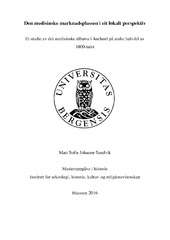| dc.description.abstract | From 1857-1897 the district medical officer (distriktslege) responsible for Aurland lived in Lærdal. One single medical visit could take days. I have in this thesis looked at what kind of medical help people in Aurland chose to use when wounded, sick or in labour, and why they chose as they did. I have looked at the recipients and providers of medical help as equal actors in a medical marketplace, and have used the three factors economy, availability and trust to try and understand what influenced people’s choices around medical help. In the extension of this I have looked at how the different actors related to each other, and the overall change over time. My main source of information has been the annual medical reports from the district medical officer to the Norwegian government. I have also used the records from the county and municipal council, the local health board and commission for the poor, the district interrogation protocol, questionnaires about local folk medicine, and letters. After looking at the local conditions in Aurland regarding health, topography, economy and culture, I have examined the local practitioners of folk medicine and official medicine; to what degree they were used and why. There is in particular one practitioner of folk medicine that stands out. This is Jens Drægeli, who had so many visitors from far and near, that he needed to build a separate infirmary. He was also for a while member of the local health commission, and received a donation from the county when he retired. His retirement also prompted the hiring of a municipal medical doctor in Aurland. When it comes to the three factors economy, availability and trust, it seems from my research that they worked together, and that they need to be looked at in combination if we want to understand people’s choices concerning medical help. In much of the previous research the focus has been on the official medical practitioners, and how they used their power to change the medical marketplace. Through this thesis it has become apparent that the power in larger degree was in the hands of the locals: Without their consent, there was little the district medical officer could do. We can also see that a part of the reason for an increasing use of official medical help, was the last district medical officer’s (Møinichen) ability to understand and work with the local population. Through that a collaboration arose, that changed the medical landscape. | en_US |
